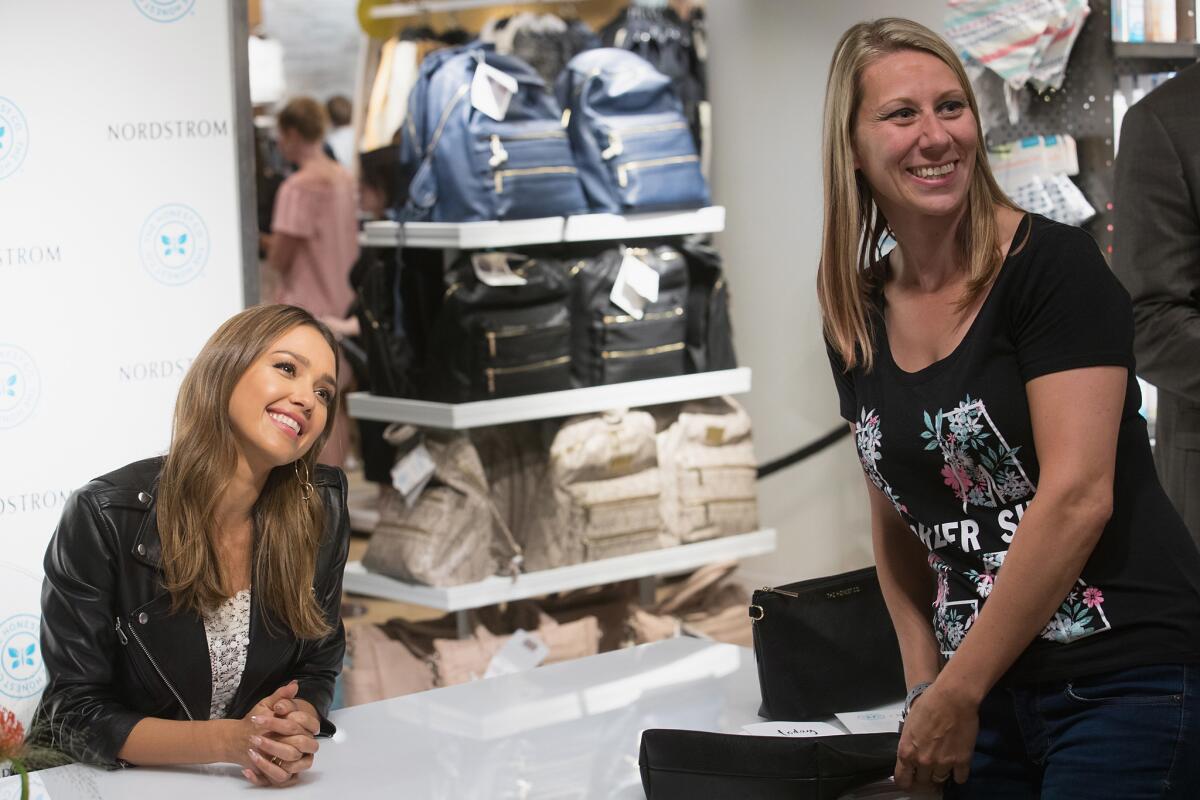Honest Co. is reportedly seeking a buyer. Why would the hot start-up want to sell?

- Share via
Last year, it seemed Honest Co., the Santa Monica start-up co-founded by actress Jessica Alba, was well on its way to becoming a Wall Street star.
The consumer goods company — best known for touting its environmentally friendly diapers and cleaning products — was valued at $1.7 billion following a funding round that raised $100 million. Among its investors were Fidelity Management & Research Co. and Wellington Management Co., two backers with the heft to stand behind an initial public offering.
But now, Honest Co. is in talks with Unilever about a possible acquisition, according to the Wall Street Journal. The sale price under discussion is above $1 billion, but well south of its soaring valuation price, the report said.
For a company said to be eyeing an IPO later this year, this about-face has the start-up community asking: What happened?
Barrett Daniels, managing partner of Nextstep Advisory Services, which helps companies go public, said he was shocked when stories leaked earlier this year that Honest was hunting for a buyer.
“I was totally surprised because they had one of the hot companies,” Daniels said. “Everyone was excited that maybe they would be one of the IPO darlings.”
Honest said it “can’t confirm anything.” Unilever said it does “not comment on market rumors.” The Journal described the talks as being in the early stages.
But longtime observers say it was probably an escalating series of events that led executives and investors to rethink the plan of forging ahead alone: backlash about the brand’s unique selling point, a valuation off the mark and a lackluster IPO market overall.
True to its name, Honest’s brand was built on a promise of honesty and transparency. But that took a hit in March after the company’s laundry detergent was said to contain a chemical it pledged never to use.
Honest Co. is also facing class-action lawsuits in New York and California that accuse the company of falsely advertising a number of its products as natural and free of harsh chemicals. (Honest has dismissed reports about its laundry detergent and also disputed the merit of the suits).
“That certainly took the shine off the company,” said Miro Copic, a branding expert and marketing lecturer at San Diego State. And it likely prompted Honest to ponder if it had the resources to repair its brand and fight legal battles, he said.
“The more lawsuits, the more negative publicity, the bigger chink in the armor — even if it’s just one or two products,” Copic said. “They have enough goodwill and celebrity star power that they can bide some of their time, but their options become limited.”
Then there’s the astronomical valuation price of $1.7 billion, which some experts have questioned. Many high-profile start-ups that have notched eyebrow-raising valuations, calculated on predictions about future growth, ultimately fall short of original forecasts, analysts said.
“A couple of years ago, money was just everywhere,” Daniels said. “Almost everybody’s valuations were wrong.”
That could be the case of Honest, whose hype attracted scores of investors who were “falling over themselves to get a part of it,” he added. “This is a story that repeats itself over and over with hot unicorns,” or start-ups that are valued at $1 billion or more.
At Honest, investors who have weighed going public, a risky endeavor, versus a sale, which guarantees a payout, probably looked at those elements and decided a sale was the most rational option, observers said.
Other Los Angeles start-ups have made similar calculations. In July, men’s grooming company Dollar Shave Club sold to Unilever for $1 billion.
A sale could provide resources that help Honest realize its more grand ambitions. Alba has said she hopes to build the company into a global brand. She’s also talked about opening bricks-and-mortar stores that combine retail with play spaces for children.
Honest reportedly pulls in $300 million in sales a year. Unilever, in comparison, raked in sales of $58 billion in its 2015 fiscal year.
Unilever “can really help you move more quickly,” said David Pakman, a partner at Venrock Partners, which led several early fundraising rounds for Dollar Shave Club. “They have incredible distribution leverage.”
As for Unilever, the consumer products giant will buy itself a well-known brand in the booming sector of green and natural goods without undertaking the cost and risk of building a rival in-house.
That Honest could ultimately fetch a price closer to fellow Los Angeles start-up Dollar Shave Club, whose annual sales were about half of Honest’s at $150 million, reveals the nitty-gritty details of how an acquisition fits into a much larger multinational firm like Unilever.
Dollar Shave Club’s inexpensive razors and grooming products have huge potential growth online, in retail stores and also internationally, analysts said. Honest, meanwhile, is already in retail outlets such as Target and Whole Foods, and is also a premium brand that would be harder to sell abroad, especially in less wealthy countries.
Dollar Shave Club has achieved its sales on just a handful of products, leaving the door open for future expansion. Honest, meanwhile, already has a sprawling lineup of merchandise that spans product categories.
Honest also faces more competitors than Dollar Shave Club. There’s also a possibility that its products could steal market share from other Unilever brands instead of rival companies such as Procter & Gamble.
Speculation is rampant that P&G could also be a suitor. Other possibilities include Clorox, the cleaning giant, and Henkel, the owner of Dial soap.
More to Read
Inside the business of entertainment
The Wide Shot brings you news, analysis and insights on everything from streaming wars to production — and what it all means for the future.
You may occasionally receive promotional content from the Los Angeles Times.











